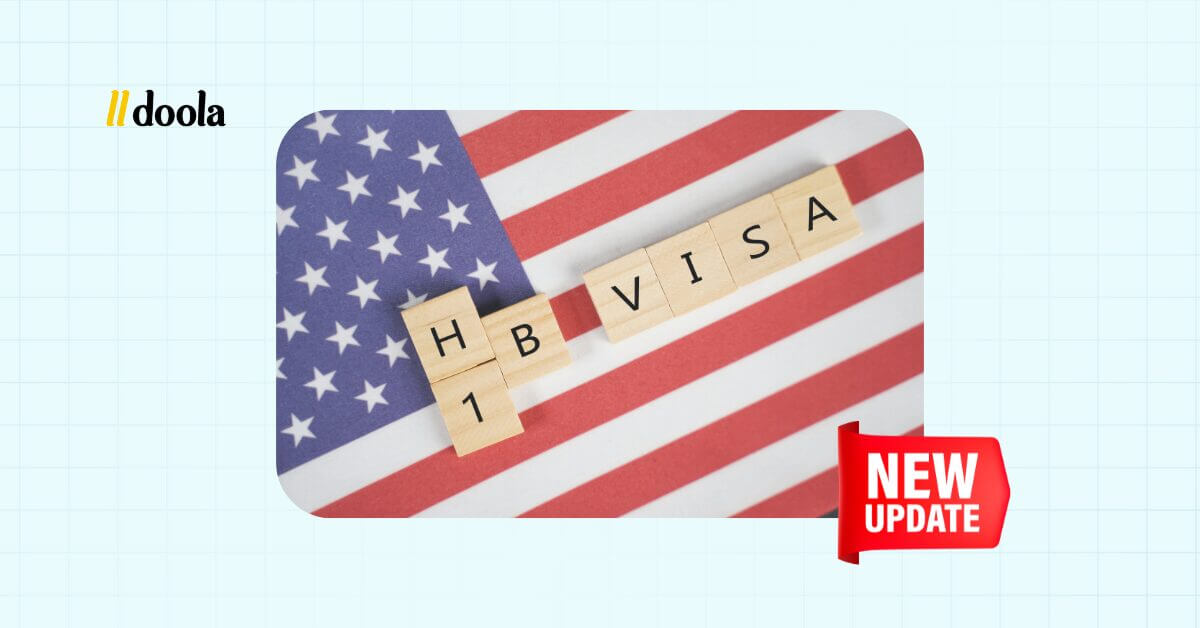
For startups and fast-growth companies, the ability to recruit global talent via H-1B has often been a crucial lever to scale.
The H-1B visa is one of the most common pathways used by U.S. employers to hire foreign professionals like software engineers, data scientists, designers, and more.
However, the U.S. government has introduced new H-1B visa rules and policy changes that could dramatically affect how business owners sponsor foreign workers.
These updates bring higher fees, stricter compliance requirements, tighter eligibility rules, and changes in how the H-1B lottery operates.
You’ll need to rethink how you attract, hire, and retain global talent since these changes could make your headcount planning, compensation modeling, and budgeting much more complex.
Let’s take a look at how these changes will impact businesses of different sizes and foreign founders.
We’ll also cover the tactical steps you can take now to adapt, mitigate risk, and continue accessing global talent, and how doola can help you stay compliant so you’re ready when you decide to sponsor talent.
Overview of the New H-1B Rules
The recent policy changes in H-1B visa program reforms aim to increase transparency, raise costs for employers, and tighten eligibility standards. However, they’ll also introduce significant financial and operational challenges for startups and small businesses.
Here’s a breakdown of the most important changes every business owner and entrepreneur should know:
👉🏼 $100,000 Supplemental Fee per Worker: Employers sponsoring a new H-1B petition (for workers outside the U.S.) must pay an additional $100,000 per worker. This is on top of existing H-1B fees.
👉🏼 Effective Date & Duration: The rule takes effect at 12:01 a.m. ET on September 21, 2025, and is scheduled to remain for 12 months (through September 20, 2026), unless extended.
👉🏼 Exemption for Existing H-1B Holders: The $100,000 fee does not apply to renewals, extensions, or individuals currently holding valid H-1B visas as of the effective date.
👉🏼 Restriction on Entry for New Visa Recipients: For beneficiaries outside the U.S., the new rule restricts entry unless the $100,000 payment is made. DHS and DOS will deny visa issuance to those without proof of payment.
👉🏼 Stricter Specialty Occupation & Wage Requirements: The administration is pushing for higher wage floors, redefining “specialty occupation,” and aligning approval with roles that pay more. This change favors higher-paid, specialized roles over volume hires.
👉🏼 Weighted Lottery Proposal Based on Wages: The new policy suggests shifting from a random lottery to a wage-weighted selection, giving preference to positions with higher salaries if visa demand exceeds caps.
👉🏼 Increased Compliance & Documentation: Employers must retain proof of the $100,000 fee, and DHS will require certification in the H-1B petition process. Enhanced audits and verification requirements are expected.
👉🏼 Presidential Proclamation Authority: The changes are being implemented via a presidential proclamation, which may be challenged in court or modified by later rulemaking.
In short, the new H-1B rules raise the cost and administrative hassle, especially for entrepreneurs and smaller firms that rely on specialized foreign workers to scale.
While large corporations may adapt more easily, smaller startups will need to rethink their hiring strategies, budgets, and global expansion plans.
Why the New H-1B Rules Were Introduced
The overhaul wasn’t random. It was framed as a necessary step to strengthen the system, protect American workers, and modernize how global talent is brought into the country.
However, the ripple effects are already felt by startups, small businesses, and entrepreneurs who rely on skilled international hires to grow.
From the government’s perspective, the new rules are meant to address three main priorities:
1. Prevent Frauds
Officials have long argued that the H-1B system is vulnerable to misuse, and these changes will stop that.
For example, there were reports of companies filing multiple applications for the same worker, job titles not matching actual duties, or recruitment agencies acting as middlemen.
2. Protect U.S. Workers
The administration wants to ensure that employers don’t hire foreign talent simply to cut labor costs.
By raising application fees and increasing salary thresholds, they aim to make H-1B hiring a deliberate, merit-based choice rather than a cheaper alternative.
3. Fund The Immigration System
The new $100,000 supplemental fee serves a dual purpose. It discourages frivolous applications and helps fund the administrative and enforcement costs of immigration processing, which have ballooned in recent years.
📌 Expert Opinions
While the goals sound reasonable on paper, the execution has drawn significant criticism from economists, immigration experts, and business leaders.
A Fortune 500 company can absorb a six-figure visa fee; a five-person startup often can’t. Critics argue that this effectively locks smaller players out of the global talent market.
Others say the policy could undermine U.S. competitiveness in the long run. Canada, the U.K., and Singapore have already rolled out more founder-friendly visa programs, and the U.S. risks losing its reputation as the world’s top destination for innovation.
There’s also concern about ambiguity and implementation. The rule doesn’t yet explain how the new fee will be collected or monitored, and compliance audits could increase administrative burdens for companies already stretched thin.
In hindsight, the new H-1B framework was built to fix existing problems, but may have created new ones for the businesses driving America’s startup ecosystem.
Impact on Business Owners and Entrepreneurs
For early-stage founders and small business owners, the $100,000 supplemental fee represents a substantial new barrier.
Most startups run on tight budgets, and adding another six-figure cost per employee makes it nearly impossible for small teams to fill in roles that are often mission-critical to scaling.
Many founders may have to pause or rethink sponsorship entirely, turning instead to remote contractors or overseas teams. This could widen the gap between well-funded tech giants and smaller, founder-led businesses that drive most early-stage innovation.
Big companies will likely adapt to these changes more easily. With deep HR infrastructure and legal departments, they can absorb the higher fees and navigate new compliance. However, they still have to face added layers of documentation, audit readiness, and justification for each hire.
Even for corporations with established sponsorship pipelines, this means longer processing times and more internal bureaucracy.
What This Means for Foreign Founders and Entrepreneurs
For international entrepreneurs, the higher cost and uncertainty around H-1B sponsorship make it harder to rely on this visa as a personal or team-building path.
Instead, founders are beginning to explore strategic alternatives, such as forming a U.S.-based LLC or Corporation to establish credibility and access to investors and clients.
Once the entity exists, they can explore visa options like the L-1 (intra-company transfer) or E-2 (investor visa), which often provide a more stable route for founders managing cross-border operations.
🔖 Related Read: How to Open an LLC for Non US Residents: 8 Simple Steps to Get Started
Why Planning Ahead Matters
The new rules demand careful budgeting, proactive legal preparation, and a stronger understanding of visa pathways.
Companies that plan early will have a significant advantage when navigating future immigration or hiring reforms. So start building compliant business structures and financial documentation now.
If your startup still hopes to hire global talent, start budgeting well in advance and explore alternatives such as the O-1 visa for individuals with extraordinary ability.
Actionable Steps for Entrepreneurs and Companies
Adapting to the new H-1B visa rules will take preparation, not panic. Taking a few structured steps now can help you protect your hiring plans and stay compliant while continuing to access top global talent.
1. Budget for Higher H-1B Costs
With the introduction of the $100,000 supplemental fee, visa sponsorship is no longer just a legal formality. Businesses should treat each H-1B hire as a long-term investment.
- Review your annual hiring budgets and forecast for additional compliance and legal costs.
- Consider adjusting salary packages or operational budgets to offset the higher expense.
- For smaller startups, evaluate whether hiring remotely (outside the U.S.) or delaying in-country employment until funding rounds increases flexibility.
📌 Pro tip: Build a “visa reserve” fund for each new hire. Planning in advance will prevent cash flow disruptions during filing season.
2. Explore Alternative Visa Options for Foreign Talent
If the H-1B path feels out of reach, several alternative visa categories might fit your needs. For example, a startup that forms a U.S. entity can bring in a co-founder on an L-1 visa by transferring them from its international office.
Exploring these routes early ensures continuity in hiring while the H-1B process stabilizes:
- O-1 Visa: This is for individuals with exceptional ability or achievements (ideal for top engineers, designers, or founders).
- L-1 Visa: This is for international companies transferring key employees to a U.S. branch or subsidiary.
- E-2 Visa: This is for investors from treaty countries starting or buying into U.S. businesses.
- TN Visa: For Canadian or Mexican professionals under NAFTA.
3. Incorporate and Establish a US Entity
For foreign founders and companies hiring globally, forming a US entity is a compliance necessity. A registered business in the U.S. makes it significantly easier to:
- Sponsor H-1B and other work visas legally.
- Open a U.S. business bank account for payroll and immigration filings.
- File taxes, access U.S. clients, and appear credible to investors.
Platforms like doola simplify this process end-to-end, helping entrepreneurs form LLCs or Corporations, obtain an EIN, set up banking, and stay compliant without needing a U.S. address or citizenship.
📌 Pro tip: If you’re a foreign founder planning to move or expand into the U.S., forming your business early gives you a stronger foundation for future visa sponsorship.
4. Seek Professional Support for Legal and Compliance Needs
Immigration and business compliance are interconnected. Partnering with the right advisors ensures your strategy is not only cost-efficient but also legally sound.
- Work with immigration attorneys to explore the best visa pathways for your situation.
- Use trusted incorporation and compliance partners like doola to establish your entity, maintain records, and file annual reports correctly.
- Keep documentation ready, such as proof of payment, sponsorship intent, and financial capability, to avoid delays during audits.
How doola Helps Entrepreneurs Navigate US Business Formation & Compliance

Visa programs like the H-1B rely on U.S. entities to sponsor foreign workers. Without a properly formed and compliant company, your ability to hire or transfer international employees is hindered.
That’s why forming a U.S. business entity is the crucial first step toward hiring globally, raising capital, and even sponsoring foreign workers through programs like the H-1B visa.
doola helps entrepreneurs worldwide launch and manage their U.S. businesses from anywhere, handling the complex parts of formation and compliance so you can focus on growth.
From your very first filing to your first hire, doola gives you the tools and guidance to operate confidently:
🚀 US Incorporation Made Simple
🚀 Get an EIN Fast
🚀 Open a US Business Bank Account
🚀 Stay Tax & License Compliant
🚀 Expert Guidance for Growth
Start your U.S. company with confidence and be ready to grow with global talent.
Launch your business with doola today.
FAQs

How much does it now cost for employers to sponsor an H-1B visa?
Under the new 2025 H-1B rules, employers must pay a $100,000 supplemental fee per worker in addition to the existing filing and legal fees (which already average between $5,000 and $7,000 per case).
Will the new rules make it harder for small businesses to hire international talent?
Yes. Larger corporations may absorb these costs, but smaller employers, particularly those still raising capital, will likely find sponsorship more challenging.
They may pivot to remote hiring, contracting, or exploring alternative visas that are more affordable and flexible.
Are there alternative visa options for entrepreneurs if the H-1B is too expensive?
Absolutely. Founders and skilled professionals have several other visa pathways to consider:
- O-1 Visa: For individuals with exceptional ability or achievements in fields like tech, science, or design.
- L-1 Visa: For transferring executives or specialized employees from a foreign company to its U.S. subsidiary.
- E-2 Investor Visa: This is for entrepreneurs from treaty countries investing in or managing a U.S. business.
- TN Visa: For Canadian or Mexican professionals under the USMCA agreement.
Do the new rules affect current H-1B visa holders or only new applicants?
The $100,000 fee applies only to new H-1B petitions filed for workers outside the U.S. Current H-1B holders, renewals, and extensions are not impacted.
However, companies will still need to comply with new documentation and wage verification standards during renewals to maintain good standing.
What steps should startups take to stay compliant with US immigration law?
Compliance begins with structure and documentation. Startups should:
✔️ Register as a US legal entity (LLC or Corporation).
✔️ Maintain clean financial records, payroll systems, and tax filings.
✔️ Work with immigration attorneys to ensure visa petitions align with job descriptions and wage standards.
✔️ Keep a public access file for every sponsored employee, as required by the Department of Labor.
How can forming a US company help international entrepreneurs access visa pathways?
Having a US business entity is often the first step toward gaining access to American visa programs. It allows you to:
- Legally sponsor yourself or your employees under H-1B, L-1, or E-2 categories.
- Open a US bank account, enabling payroll and visa-related financial transactions.
- Build a credible business presence for investors, clients, and US agencies.









